News from Maison de la Gare
A New Adventure Begins
Tweeter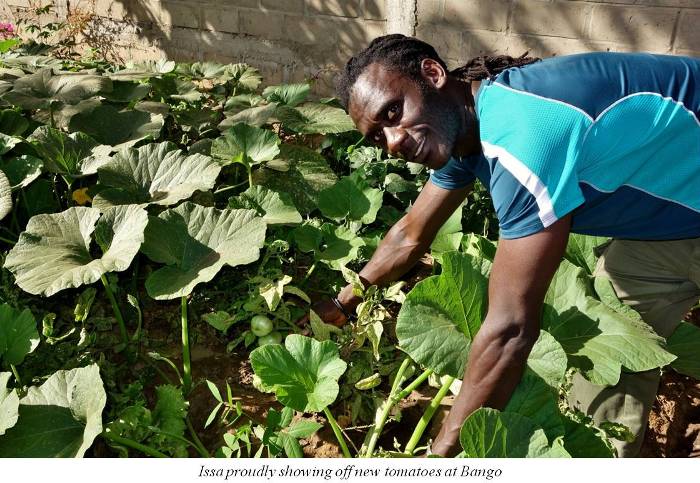
Maison de la Gare's agricultural apprenticeship program in Bango is born
For many years, the garden
in Maison de la Gare’s centre in Saint Louis has been an oasis of greenery
and tranquility in the lives of the begging talibé street children. For
the many 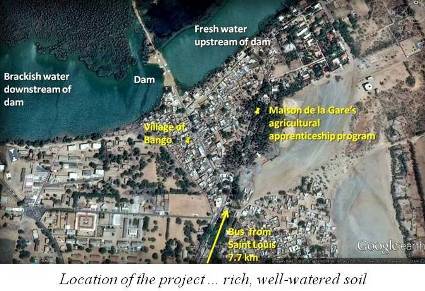 children who have been directly involved in planting, cultivating,
watering and otherwise caring for the garden, it has provided stability in
their lives, giving them a sense of pride and responsibility and providing
them with skills that will help them to eventually reintegrate into the
farming communities that they come from. Gardening has become a doorway
to autonomy for these children.
children who have been directly involved in planting, cultivating,
watering and otherwise caring for the garden, it has provided stability in
their lives, giving them a sense of pride and responsibility and providing
them with skills that will help them to eventually reintegrate into the
farming communities that they come from. Gardening has become a doorway
to autonomy for these children.
The garden is small, however, too small for the ever increasing numbers of
vulnerable 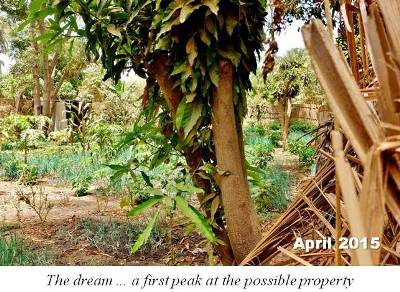 children who see it as an opportunity to work towards a better
future. Many of the older talibé youth, typically between 17 and 25 years
old, have wanted to take part, but there just has not been enough space
for them to assume meaningful roles.
children who see it as an opportunity to work towards a better
future. Many of the older talibé youth, typically between 17 and 25 years
old, have wanted to take part, but there just has not been enough space
for them to assume meaningful roles.
Issa Kouyaté, Maison de la Gare’s president, has dreamed for over six
years of acquiring a plot of land that could be used to establish an
agricultural apprenticeship program for these older talibé children. He
has found many potential properties over the years, but has never had the
financial means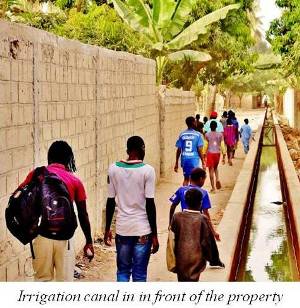 to go forward. The possibility became real during a
discussion with GO Campaign of Santa Monica, California in early 2015. GO
Campaign had given a grant to Maison de la Gare in 2014 that made it
possible to build the emergency shelter in our Saint Louis center. With
the success of this project, they were looking for another way to help.
We prepared an application and, shortly afterwards, they provided funding
to enable us to buy the land and start the project.
to go forward. The possibility became real during a
discussion with GO Campaign of Santa Monica, California in early 2015. GO
Campaign had given a grant to Maison de la Gare in 2014 that made it
possible to build the emergency shelter in our Saint Louis center. With
the success of this project, they were looking for another way to help.
We prepared an application and, shortly afterwards, they provided funding
to enable us to buy the land and start the project.
We found an ideal site for our purposes in Bango, a town seven kilometers
from our center in Saint Louis. The property, 621 square meters in size,
is located next to an irrigation ditch that supplies water. Thanks to
the location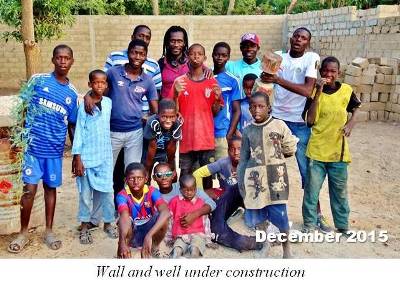 in the delta of the Senegal River, the soil is rich and well
suited to growing market vegetables. Purchase of the land was completed
by mid-summer of 2015 and the first sections were planted shortly after.
The plants grew well and we were expecting an early crop. However, a
short time later, everything was destroyed by the incursion of a herd of
cattle. We realized that we had to start over, after building a solid
wall around the field.
in the delta of the Senegal River, the soil is rich and well
suited to growing market vegetables. Purchase of the land was completed
by mid-summer of 2015 and the first sections were planted shortly after.
The plants grew well and we were expecting an early crop. However, a
short time later, everything was destroyed by the incursion of a herd of
cattle. We realized that we had to start over, after building a solid
wall around the field.
Everything was ready 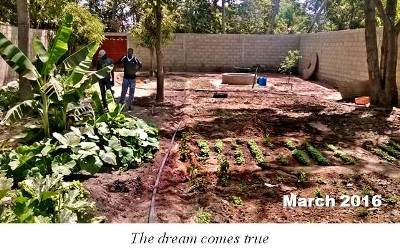 by the end of the year, the wall, doors and a
ten-meter deep well. Issa was the first to taste the water from the new
well and, fortunately, he confirmed that it is very good. We started
2016 with new plantings, this time very successfully. Seydou, an
experienced local farmer, agreed to supervise the property and to serve
as a teacher and mentor for the children.
by the end of the year, the wall, doors and a
ten-meter deep well. Issa was the first to taste the water from the new
well and, fortunately, he confirmed that it is very good. We started
2016 with new plantings, this time very successfully. Seydou, an
experienced local farmer, agreed to supervise the property and to serve
as a teacher and mentor for the children.
Several initial crops have now been harvested, helping us to see what
can be most successful as a base for the future. Many of the
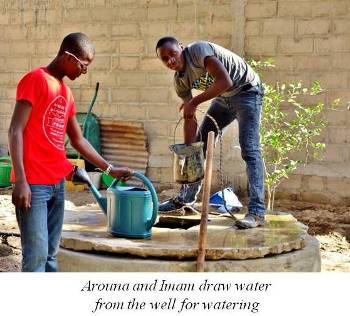 young people
are only beginning to appreciate the opportunity that this new space
offers. As more and more of them visit the property and as the children
who are involved talk about their experiences, the numbers are growing.
The first harvests have shown how fertile the land is, and the experience
has let us see which of the young people are ready to fully commit to
this activity. For these children, they are already feeling more
independent and can see clearly how their involvement can lead to a
meaningful future. Maison de la Gare is making great strides both in
developing the property and in supporting the talibés who are involved,
encouraging them in their efforts and helping them to become
increasingly self-confident.
young people
are only beginning to appreciate the opportunity that this new space
offers. As more and more of them visit the property and as the children
who are involved talk about their experiences, the numbers are growing.
The first harvests have shown how fertile the land is, and the experience
has let us see which of the young people are ready to fully commit to
this activity. For these children, they are already feeling more
independent and can see clearly how their involvement can lead to a
meaningful future. Maison de la Gare is making great strides both in
developing the property and in supporting the talibés who are involved,
encouraging them in their efforts and helping them to become
increasingly self-confident.
Imam is one of the talibé youth committed to this project. In his
words, 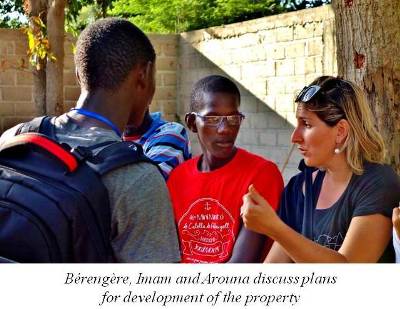 "Everything is going well, a good start. It's good to be
busy. For the future, I hope this will continue and help me to find
work."
"Everything is going well, a good start. It's good to be
busy. For the future, I hope this will continue and help me to find
work."
We express our profound thanks to GO Campaign and to everyone who
has made possible this new adventure for the children of Maison de
la Gare, a pathway to becoming self-sufficient contributors to society.



























